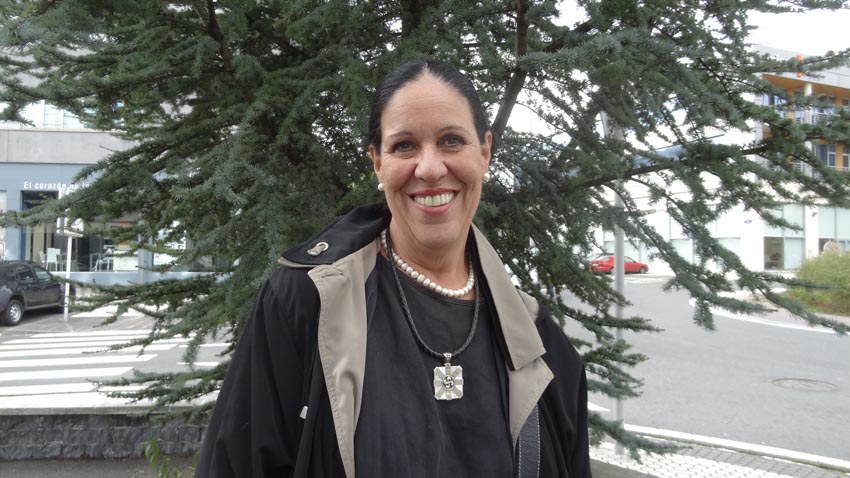Joseba Etxarri. It has been 10 years since she’s returned to Euskadi and this time she came with her mother and sister. At the beginning of the last decade, she did so to spread her father’s ashes, Felix Arrieta Etxeberria, on Arrate. Her father passed away just days before their big family trip with children and grandchildren to share his homeland with them. Now, back in Euskadi for a few days, Jaione can’t hide her satisfaction with the strength of the Eibar soccer team and is excited to see the landscapes of her second home. She tells us that she created the VascosMexico list shortly after the death of her aita, with whom she felt especially close. Basque and Mexican, she resides in Queretaro and even though she studied Organizational Psychology, she works in real estate. “If you need help finding an apartment in Mexico, don’t hesitate to contact me,” she says with a smile.
Mexico welcomed a large number of Basques after the Spanish war of 36. The Basque Government recognized this by awarding the country the Lagun Onari (Good Friend) in 2009. Your grandparents arrived at that time.
-My grandparents on the Galarraga side arrived to Mexico in 1939 when my mother was 8. My grandfather was a republican and his brother, Jacinto Galarraga Acha, was among those that declared the Republic in Eibar; and grandpa had been director of Industry of War, so they had to flee. When my mother finished her degree in Chemistry she didn´t know or remember Euskadi, so in 1954 my grandparents and my mother traveled by car to New York, to board a ship to Rotterdam, and from there they made it to the border, but they wouldn’t let my grandfather cross the border because of Franco's fascist regime. So his family went to visit him in Hendaia and my grandfather returned to Mexico, while my grandmother and mother stayed in Eibar for six months. There, in a café in the Unzaga Plaza, she met my father. Later my mother returned to Mexico, and my father followed her, so in 1955, at the age of 28 my father arrived in the country where he would marry my mother and where they would raise their four children: Aitor, Asier, Nerea and I, the second child.
Born in Mexico but you were raised in touch with Basque. All of you have Basque names.
-Yes, that’s right, we were part of the Basque club in Mexico City from a young age, it was a family thing. At home, our parents and grandparents spoke Basque and I was a dantzari until the age of 15 or 16. In 1970, I traveled to Euskadi for the first time and for many years, we would come back every summer. We were always in touch with family and friends. Also with the DF Basque club, more intermittently like when I married, and later when I divorced I “returned to the fold.”
In 2003 you created the listserv, VascosMexico, which remains today a referential channel for the Basque-Mexican community.
-It was a response to a necessity. Mexico is a big country and needed a channel or a way to share Basque news. In very little time it became so strong that it became the reference. Its inauguration coincided with the visit of Lehendakari Ibarretxe to Mexico and the opening of the Delegation of Euskadi in Mexico City. That was the first event that I covered. During several years I was reporting every Basque event that happened. I started taking pictures, and people like it and the initiative was a big success. This changed a bit when I moved from from Mexico DF to Queretaro, but I can say that we still have nearly 20,000 photos, more than one thousand subscribers to the page and almost 400 members on the listserv.
You were also Basque club vice-president, with Miren Aguirre's team.
-We are good friends and Miren was asked to run as president and she proposed me to be her vice-president. The truth is, that it was a beautiful time, a lot of activity and a lot of work happened at the club then.
There is a number a Basque companies stablished in Mexico and a lot of young Basques working in the country.
-Yes, but I don’t think they go to the Basque club much. Some find mates and marry Mexican women, but it seems to me that Mexican women draw them more to their culture and so their children don’t participate in the club much. There are activities that bring folks together like the Tamborrada in January that attracts more Mexicans and is better attended than San Ignacio or Aberri Eguna it seems to me. Baztan Eguna also brings a lot of people; many Basque club members are originally from Navarre.
The club is now organizing “Emakume Eguna.”
-It will be on Saturday, November 28 and will be a women’s only event for all women who have ever been a part of the club. We women deserve this small tribute. It is being organized by Itxaropen Palacios, Itziar Urquiola, and Miren Aguirre and I think it is a phenomenal idea. We are very excited and there is no doubt that it will be a big success.






 Send to a friend
Send to a friend Add comment
Add comment








